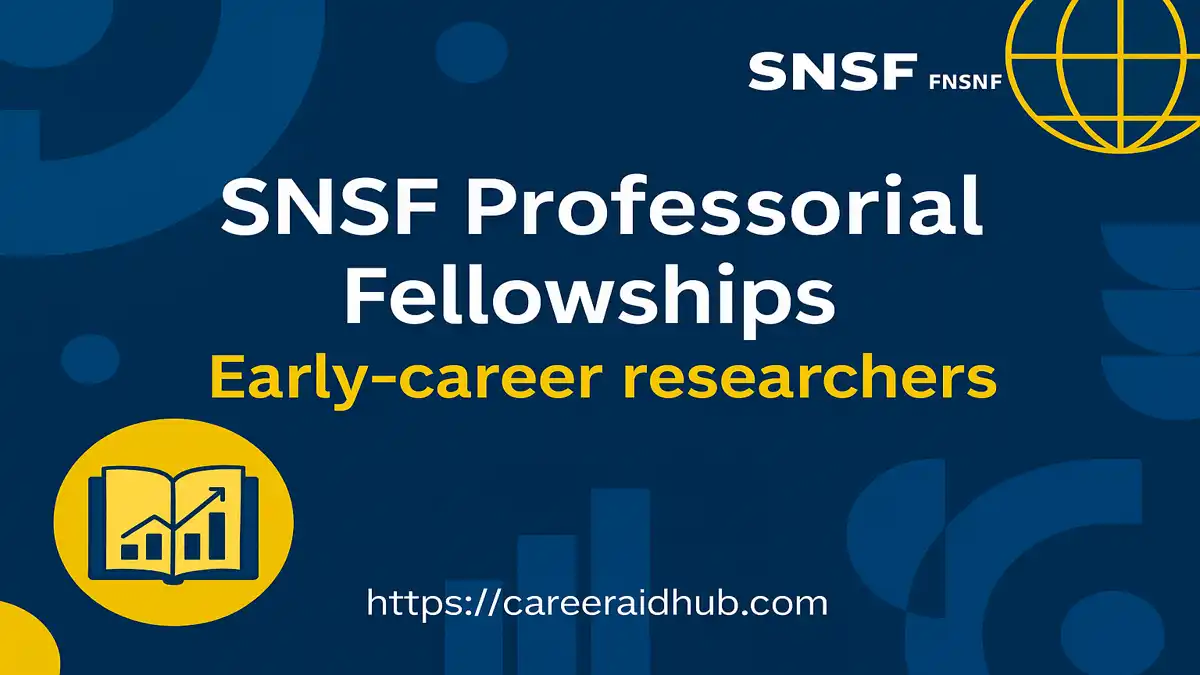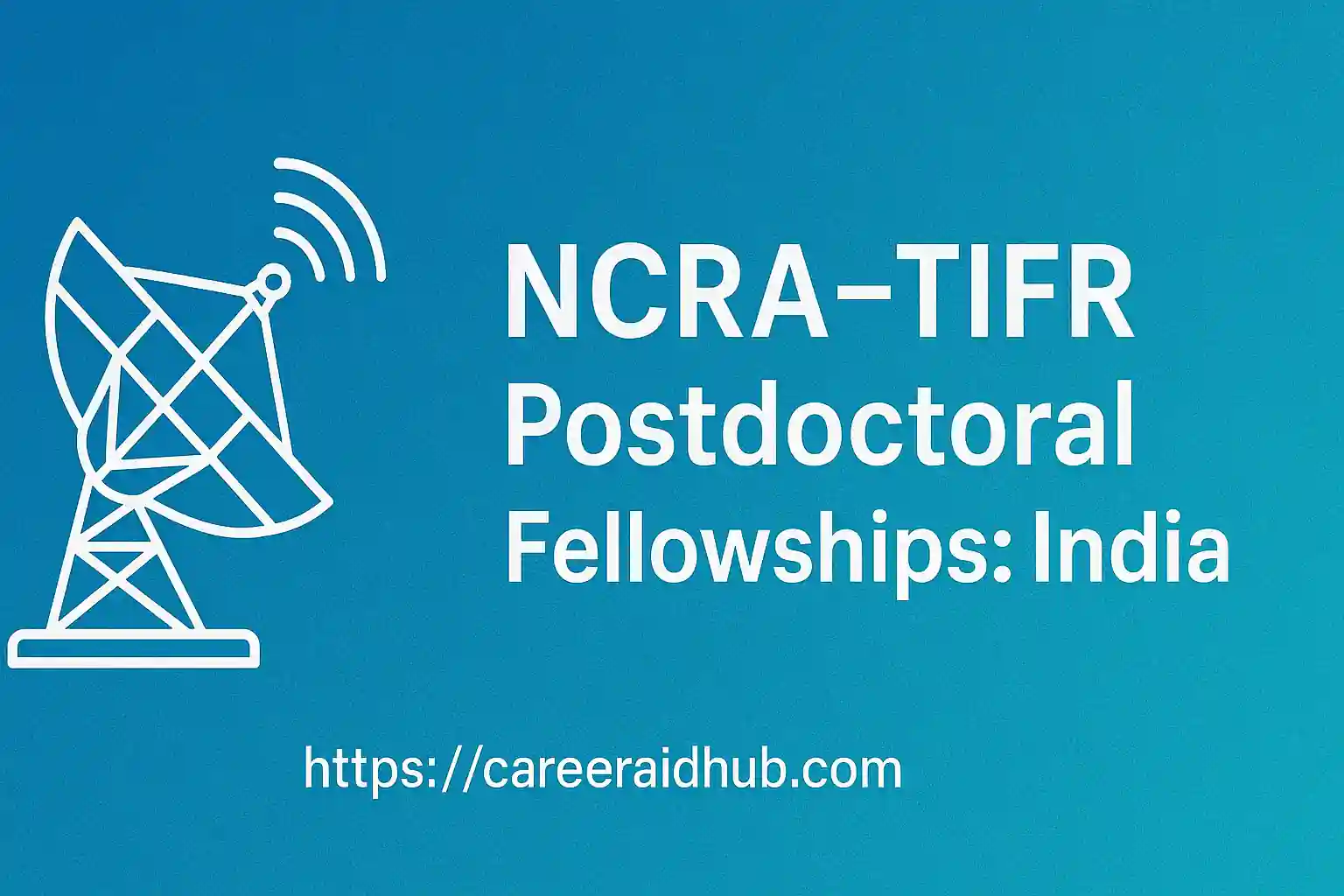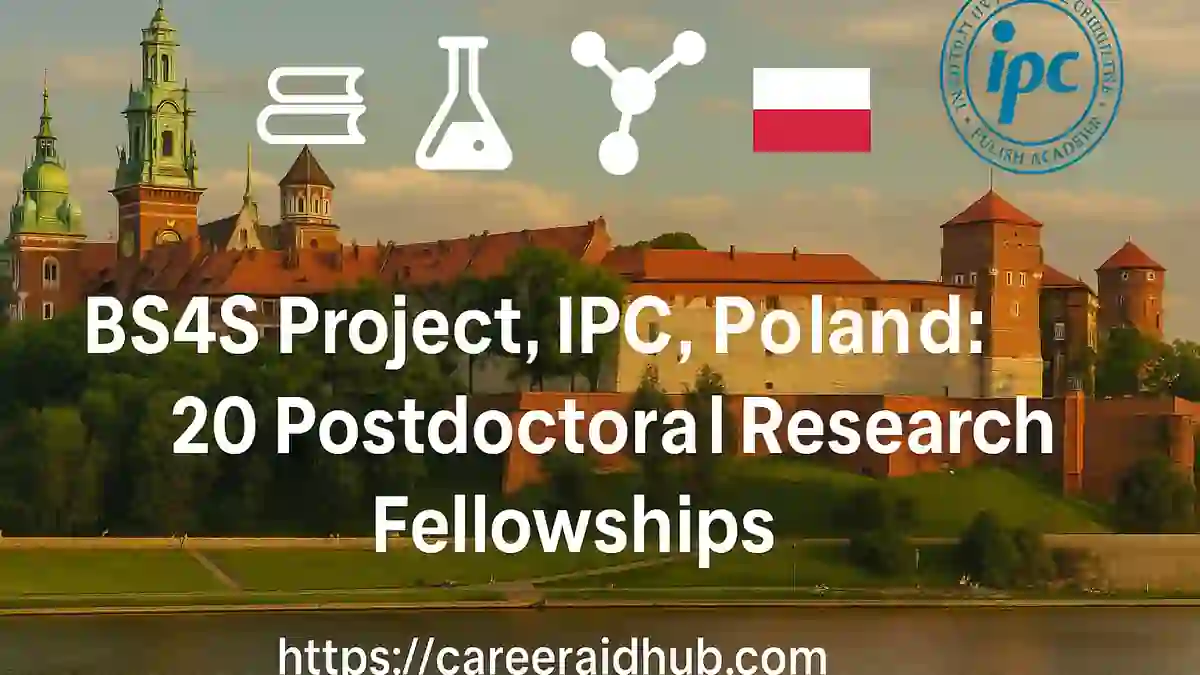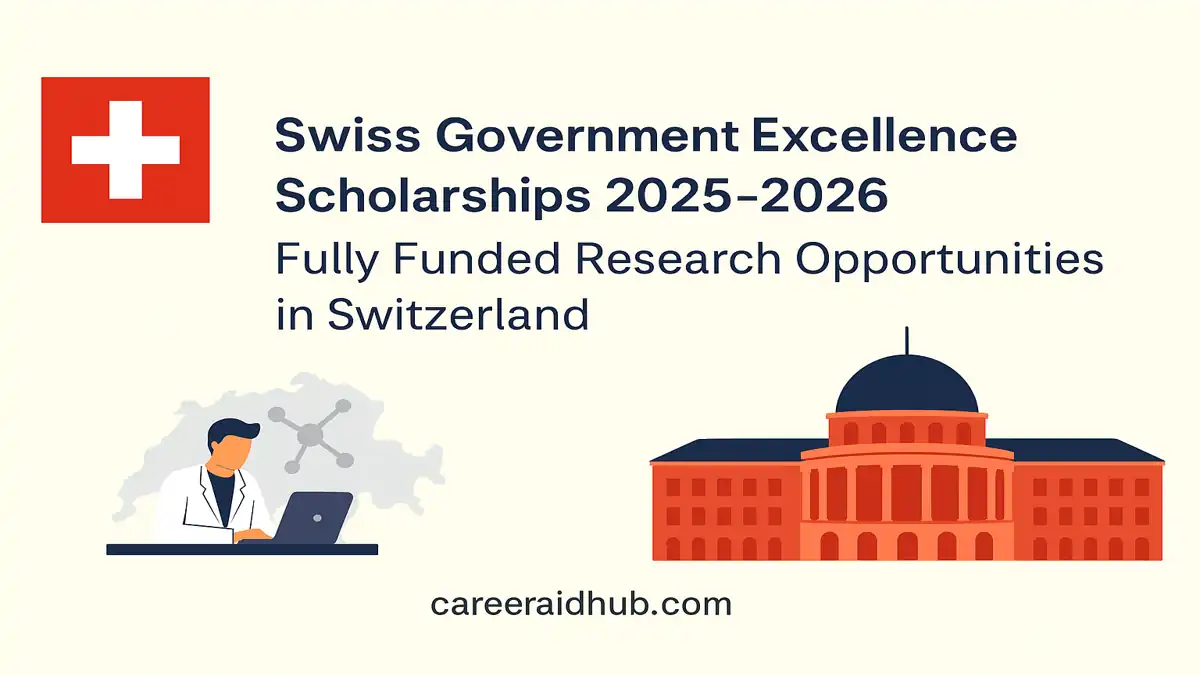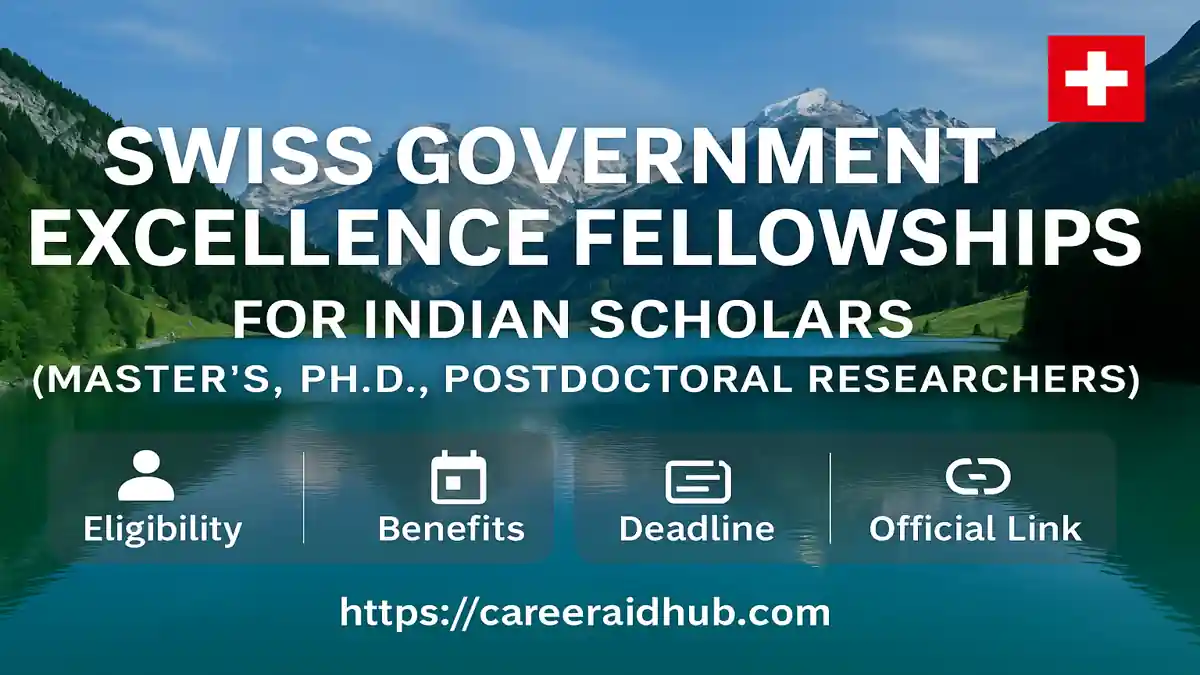SNSF Professorial Fellowships: Career-Level Funding for Researchers in Switzerland
The SNSF Professorial Fellowships represent a major funding initiative launched by the Swiss National Science Foundation (SNSF), merging two of its most prestigious career grants—PRIMA and Eccellenza—into a single, streamlined program. Designed to provide researchers with the opportunity to secure an assistant professorship while independently leading a research team, this initiative reflects SNSF’s commitment to fostering excellence and inclusivity in academic careers in Switzerland (SNSF).
The SNSF Professorial Fellowships combine the former PRIMA and Eccellenza grants into one robust program. This initiative supports early-career researchers aiming to establish themselves as independent investigators with assistant professorship status at Swiss institutions.
Vision and Strategic Objectives
The SNSF Professorial Fellowships are built on the vision of advancing Swiss research through:
Comprehensive funding: Up to CHF 1 million in project support in addition to the fellow’s salary for a five-year period.
Academic autonomy: Awardees are granted assistant professorships, empowering them to establish research groups and supervise doctoral students.
Gender equity measures: The program integrates targeted actions to promote gender balance in academic leadership.
Administrative clarity: Merging PRIMA and Eccellenza reduces complexity and creates a unified, high-visibility funding route.
This holistic model enhances access while maintaining a rigorous merit-based selection process.
Key Features and Funding Benefits
Fellowship Funding and Duration
Total funding: CHF 1 million maximum for project-related expenses, plus full salary for the assistant professor role.
Fellowship term: Up to five years, renewable only through external professorship calls.
Eligibility and Application Window
Postdoctoral experience: At least three years post-PhD research required.
Academic age: Applicants must be within 10 years of their doctoral defense. Clinical researchers may apply up to 14 years post-degree.
Swiss academic connection: Must have either a Swiss degree, Swiss nationality, or at least two years’ experience at a Swiss research institution.
These criteria reflect a deliberate effort to support talented researchers while maintaining flexibility for diverse academic trajectories.
Call Timeline
Call launch: Annually around November.
Application deadline: Typically due in February (exact date will be updated).
Results announcement: Usually in mid-year after multi-stage evaluation.
Eligibility Criteria and Requirements
To apply, researchers
Not hold a professorial position at the time of submission.
Secure a written commitment from a host Swiss university, agreeing to employ the fellow as an assistant professor if selected.
Submit a complete application via the mySNF platform.
Applicants may apply twice in total. A second attempt must directly address feedback from the first submission.
These guardrails ensure quality, readiness, and strategic alignment with Swiss institutional goals.
Application Procedure and Key Documents
Pre-Application Checklist
Register on mySNF early and verify eligibility.
Engage with a suitable host university to obtain internal backing and logistical support.
Required Documents
Extended synopsis (~5 pages) describing the research idea and vision.
Full research plan (~20 pages) for shortlisted applicants.
Detailed CV, including publications, grants, and teaching experience.
Data Management Plan submitted via the mySNF system.
Net academic age declaration, including justified interruptions.
Institutional support letter from the host confirming role and facilities.
Detailed budget: Staff, travel, consumables, and infrastructure
needs.
SNSF emphasizes punctuality and completeness—late or partial submissions are not considered.
Evaluation Stages
Phase 1: Synopsis and eligibility screening.
Phase 2: Full proposal review and interviews.
SNSF applies DORA principles, ensuring that evaluations prioritize the quality and originality of research over institutional reputation.
Selection Criteria
Fellowship applications are judged on the following dimensions:
Research excellence and project originality.
Feasibility and alignment with existing scientific infrastructure.
Leadership potential and ability to build a research team.
Relevance to Swiss and international research priorities.
Gender equity awareness, with considerations for family breaks and support options.
Approximately 45 fellowships are awarded annually, affirming the program’s competitiveness and high standards.
Comparison with Previous Schemes
| Feature | SNSF Professorial Fellowships |
|---|---|
| Combined Programs | PRIMA + Eccellenza |
| Project Funding | Up to CHF 1 million |
| Salary Coverage | Included |
| Eligibility Period | 10 years post-PhD (14 for clinical MDs) |
| Minimum Postdoc Experience | 3 years |
| Academic Position | Assistant Professor |
| Gender Equity Support | Integrated and prioritized |
This merger preserves the strengths of PRIMA and Eccellenza while improving consistency and equity.
Strategic Impact and Institutional Benefits
Strengthening Swiss Research Capacity
The program supports academic independence early, allowing fellows to drive research directions and secure external collaborations.
Promoting Equity and Inclusion
By extending eligibility windows and integrating flexible career metrics, the program increases access for women, clinical researchers, and those with non-linear careers.
Enhancing Institutional Networks
SNSF Professorial Fellows act as bridges between universities, funding agencies, and industry, furthering international cooperation and innovation.
Creating Long-Term Value
These fellowships not only fund individuals but also embed high-performing talent into the Swiss academic system, driving excellence across multiple disciplines.
Tips for a Strong Application
Secure host support early: Begin dialogue with university leadership well before the call opens.
Align proposal with SNSF priorities: Clearly define national and global relevance.
Craft a strong synopsis: Make the early-stage review count.
Demonstrate strategic planning: Show your roadmap for building a team, securing co-funding, or collaborating with industry.
Explain gaps transparently: Detail any career interruptions, using the net academic age format.
University Support and Preselection
Swiss host universities often conduct internal screening rounds to identify competitive candidates. To navigate this:
Contact the research services or grants office well in advance.
Confirm institutional requirements beyond SNSF mandates.
Join proposal development workshops, often available to internal applicants.
Conclusion and Next Steps
The SNSF Professorial Fellowships offer a transformative opportunity for early-career researchers to establish their academic independence in Switzerland. By merging PRIMA and Eccellenza into one comprehensive program, SNSF has streamlined access while preserving excellence, diversity, and institutional support.
Researchers aiming to apply should begin preparations by September, anticipating a call launch in November and final submission deadline in February (exact dates will be updated soon).
For full program details and updated timelines, visit the official SNSF Professorial Fellowships page.
References
Recommended Update Cycle
Review and update this article every 6 to 8 months to reflect any changes in SNSF funding policy, application windows, or host institution processes.
| Feature | Details |
|---|---|
| Program Name | SNSF Professorial Fellowships |
| Host Country | Switzerland |
| Funded By | Swiss National Science Foundation (SNSF) |
| Duration | Up to 5 years |
| Study Mode | Full-time (with assistant professorship status) |
| Eligibility | PhD holders with 3+ years postdoc; up to 10 years post-PhD (14 for medical) |
| Financial Support | Up to CHF 1 million + full salary for assistant professor role |
| Fields of Study | All disciplines supported by Swiss universities |
| Deadline | February (expected); next call opens November (we will update soon) |
| Official Website | SNSF Professorial Fellowships |
External Authority Links:
📌 Frequently Asked Questions (FAQs)
The SNSF Professorial Fellowship offers up to CHF 1 million plus salary for early-career researchers to lead projects and gain assistant professorships in Switzerland.
Researchers with a PhD and at least 3 years of postdoctoral experience, within 10 years of PhD defense, can apply if supported by a Swiss host institution.
The fellowship offers up to CHF 1 million in research funding, plus full salary for a five-year assistant professorship at a Swiss university.
The fellowship covers a full-time assistant professorship role for up to five years, including salary and research support.
Yes, international researchers can apply if they have Swiss academic links, such as citizenship, degree, or two years’ experience in Switzerland.
The application deadline typically falls in February. However, call announcements usually open in November. Please check for updates.
SNSF evaluates scientific excellence, innovation, leadership potential, feasibility, and commitment to gender equality in the academic proposal.
Yes, applicants may apply up to two times. The second application must respond clearly to previous reviewer feedback.
Yes, awardees hold assistant professorship status, allowing them to supervise PhD candidates and build an independent research group.
Yes, clinical researchers holding a medical degree can apply up to 14 years post-degree, with adjusted academic age considerations.

